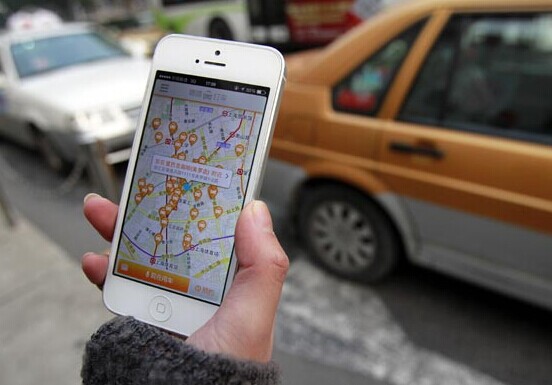

A customer checks his smartphone app that eases finding a taxi. Ding Ding / China Daily
Thirty-one-year old Beijing office clerk Liang Ping is having an especially busy June. She is required to cook every single day this month for her husband.
It has nothing to do with male chauvinism, but instead the payment of a lost bet. He predicted that the government would interfere sooner or later when taxi-calling apps got popular, especially after promotional efforts by apps operators earlier this year.
Liang is now honing her culinary skills because her husband was right.
She is a fan of apps like Didi and Kuaidi, which gave subsidies up to 15 yuan ($2.4) to both taxi drivers and passengers for a trip.
With a tap on her cell phone, Liang could easily find a taxi driver to take her to work at less cost than normal fares while her husband, who had no taxi-hailing apps on his mobile phone, was often refused by taxi drivers eager to pick up customers like Liang.
But the visible hand of regulators came out on May 26 when the Ministry of Transport issued a notice to solicit public opinion on regulating taxi-hailing tools.
Operators Didi and Kuaidi, the two most popular apps, now wait to see what is cooking for them. One of the articles in the ministry's notice calls for taxi-calling apps to share information.
It would be a heavy blow, said industry insiders, who explain it would mean efforts by the two companies and their combined subsidies of more than 2 billion yuan to woo users in the past two years would probably have been in vain.
Both apps launched in late 2012. Didi had attracted 100 million users nationwide by late March while Kuaidi, according to its website, is generating a combined average of 6.23 million orders every day in more than 200 cities from Beijing to Lhasa.
For Internet-based companies, information accumulated in daily operations is one of the most important assets that give a competitive edge, He Xia, a senior engineer at the Ministry of Industry and Information Technology, said in an interview with Guangming Daily.
Zhang Yu, a managing director of Shanghai-based consulting firm Automotive Foresight, told China Daily that the move goes against the principle of free competition and "will kill innovation".
Another controversial component in the notice is the proposal that all taxi-calling tools be integrated into a uniform system run by the transport ministry, which would distribute customer orders to terminals installed in taxis. Those who refuse to join the system will be banned, said the proposed regulation.
While Kuaidi developer and operator Hangzhou Kuaizhi Technology Co was not available for an interview, an executive at Beijing Xiaoju Technology Co, which runs Didi, said he is worried about the performance of the suggested integrated system.
"A single, uniform platform means it cannot be updated frequently and more importantly it will kill the core competitive edge of taxi-hailing apps - the accurate order distribution capacity empowered by big data," said Xiaoju Technology Vice-President Wang Xin in an interview with the Guangming Daily.
Yang Yingjun, a researcher at the transport ministry, told the newspaper that the integrated system is meant to help supervision, but will not change taxi-hailing apps' functions or competition.
Yet Wang said terminals in taxis "are inferior to mobile phones because both drivers and passengers can frequently update software in mobile phones".
Many taxi drivers and passengers said they would like less government interference, as they have no idea of what the so-called uniform system would be like.
"I prefer to keep the existing apps," said a Beijing-based taxi driver surnamed Sun.
"They indeed help us pick more passengers and the mobile payment enabled by the apps has reduced the chance of receiving fake money," said Sun.
A 2014 survey by Tsinghua University showed that 90.3 percent of 514 polled taxi drivers in six cities said the apps have helped them cut driving in search of a fare. Fifty-five percent said their monthly income has risen by 10 percent to 30 percent.
Fares are also mentioned in the notice. Despite widespread agreement that taxi drivers should not ask for extra money, many said it is another option to call a taxi by offering tips.
Zhang Lan, a translator in Beijing, said it actually helps distribute the resources to those who need it most.
"If you live in remote areas where taxis are rare and have an emergency like taking sick family members to the hospital, offering tips can cut your time waiting," said Zhang.
Liang, who will continue cooking until the end of June, said she will take advantage of this time to take a taxi to the market because "nobody knows whether hiring a taxi will remain so easy when the ministry's notice turns into law".
Kuaidi taxi app offers cash vouchers
2014-06-13Shanghai traffic committee to push for release of taxi app user data
2014-05-28Taxi app Didi Dache orders fall 40%
2014-05-22Shanghai taxi firms launch rival booking app
2014-05-21Copyright ©1999-2018
Chinanews.com. All rights reserved.
Reproduction in whole or in part without permission is prohibited.